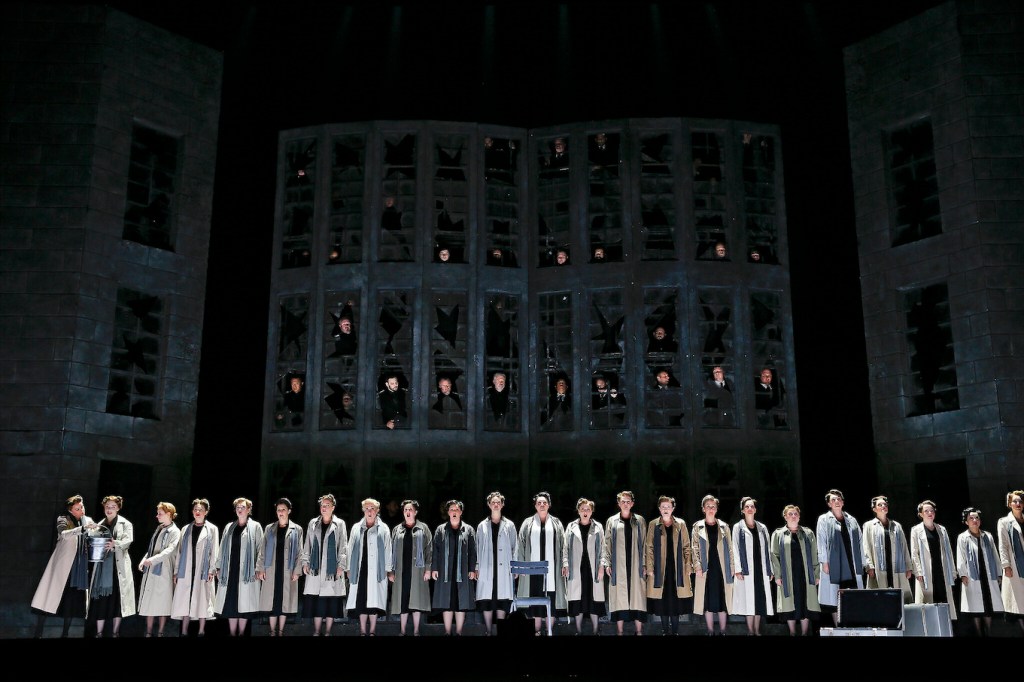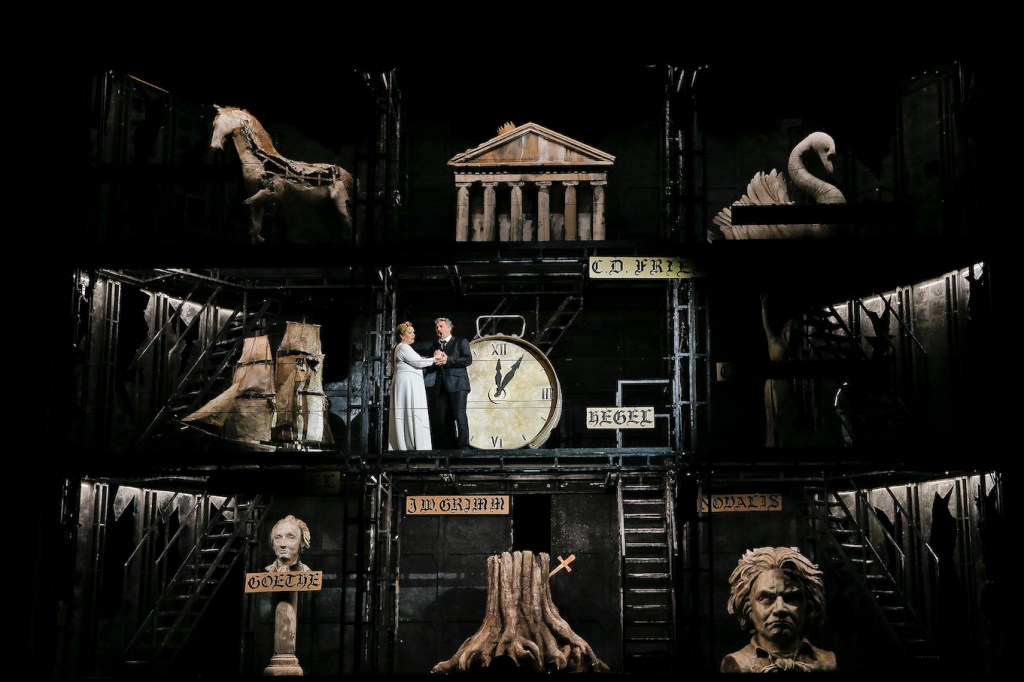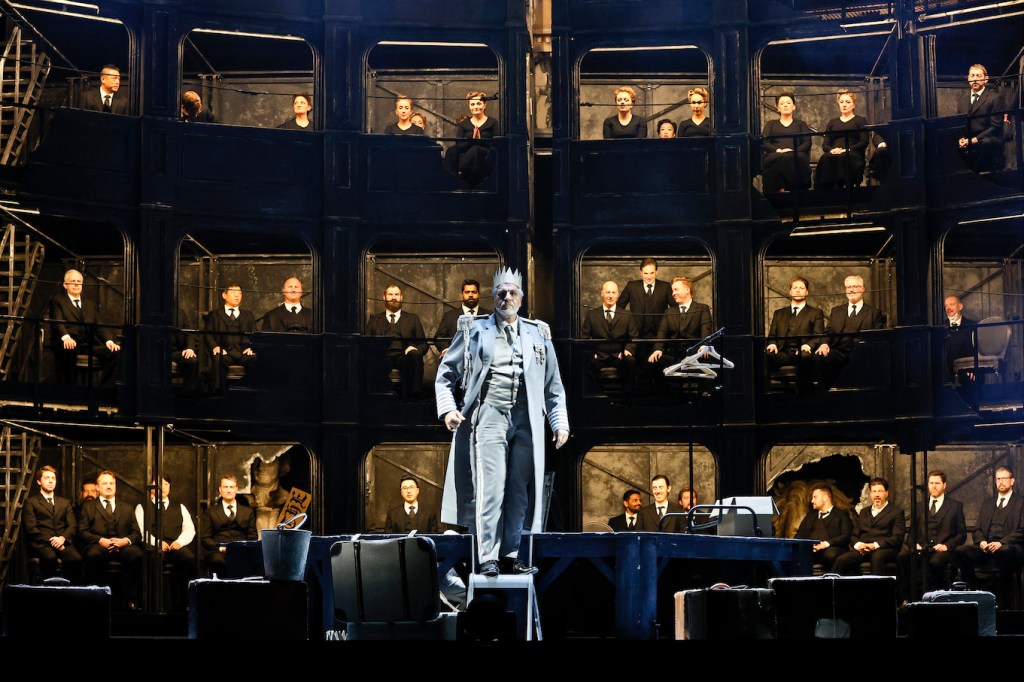In a mighty coup for Melbourne, world-conquering tenor Jonas Kaufmann graces the ranks of Opera Australia for a fully-staged production of Wagner gem Lohengrin.
While Kaufmann’s appearance is the chief attraction, and one that added a hefty premium to ticket prices once his casting was announced, he is surrounded by an outstanding set of fellow principal singers, a massive, expertly prepared chorus and a tremendous orchestra. In short, the music is uniformly of the highest quality and is an absolute pleasure to hear.
Given the recent proliferation of productions of Wagner’s works in Melbourne, local audiences are well placed to appreciate this high-concept staging of Lohengrin. A co-production with Théâtre Royal de la Monnaie, the scenery is impressively grand in scale if rather drab in grayscale tone.
While original director Olivier Py apparently took to the stage with microphone at the beginning of every performance in Brussels to mansplain his concept, the exorbitant prices for this Melbourne season do not even include a cast sheet.
Significantly updated from Wagner’s original setting, Py takes a hint from controversial aspects of Wagner’s life and places the action in battle-ravaged Berlin after World War Two. Curiously, while the sets bear broken window panes and scarred walls, the people of Brabant are pristine in appearance.
A massive revolve turns slowly to reveal a proscenium arch of sorts, with meta theatrical aspects such as backdrops visibly winched into place and costumes hanging on racks. In a clever touch, King Heinrich and Telramund complete their act one battle as a game of chess. Most curious in the overall concept is the beginning of act three, in which a shirtless man performs Cirque du Soleil-style acrobatics.
Clad in black, Telramund and Ortrud channel Macbeth and Lady Macbeth. Py casts an additional villainous light on Ortrud, showing her commit the murder of the child-Duke Gottfried of Brabant, a crime more horrific given that her husband Telramund was guardian of the child, who was the dear younger brother of angelic, falsely accused Elsa.
Generally playing down any supernatural elements, Py excises any vision of a swan-drawn boat, simply having Lohengrin appear on stage as the set revolves, with the knight first seen playfully engaging with the spirit of Elsa’s deceased brother.
The State Theatre’s Wagnerian orchestra pit hosts a vast contingent of players from Orchestra Victoria, superbly led by maestro Tahu Matheson. In the grand circle, a brass quartet (and then another) add stereophonic splendour.
Generously featured in this work, the vocals from the Opera Australia Chorus are nothing short of exquisite. Given revival director Shane Placentino’s flair for movement, it is a shame that he needed to follow the original staging by including such static, uninspired block positioning for the chorus.
American soprano Emily Magee skilfully maintains the anxious tension of Elsa, who grieves for her brother while being forcefully questioned over his disappearance as well as being manipulated to uncover and reveal the name of her new love. Magee sings with richly voluminous tone and yet deliberately holds back on creating a sound that could be described as pretty given the tension experienced by the character.
Baritone Simon Meadows elevates the role of Telramund with thrilling vocal expression that brings a genuine air of excitement and danger to the role. While Meadows has been steadily building an impressive repertoire of roles, this performance serves as a high-profile advance that portents extremely well for future appearances.
Excellent throughout the opera, French-Russian mezzo soprano Elena Gabouri is electric in act two, in which Ortrud drives the drama ever forward, memorably portraying Ortrud as a woman driven for revenge at all costs. Gabouri and Meadows bring a mature sexuality to the pair, allowing their passion to erupt in unbridled physical displays of lust.
Drawing on his immaculately polished skills not just with opera but with German lieder, Kaufmann brings tender sensitivity and ardent romance to the noble knight, bringing forth the knight’s power in the gentlest manner and exerting a calming effect on Elsa when she is addled by Ortrud’s manipulations.
Act three sees the title role really come to the fore. Following a heavenly rendition of “Treulich geführt” (the Bridal Chorus) from the full massed chorus, Kaufmann and Magee delight in “Das süsse Lied verhallt” as they bathe in newly wedded bliss amidst the giant artefacts of a German museum**. Kaufmann runs the gamut from swooningly romantic to darkly indignant, taking the chance along the way to demonstrate the most extraordinary pianissimo.
In the subsequent show-stopping aria “In Fernem land, unnahbar euren Schritten,” Kaufmann has the stage to himself and the audience completely in his thrall, but then has the indignity of the revolve trundling back around during the climax of the aria as his character finally reveals his name and heritage.
Although the Herald does not have an emotional arc into which Warwick Fyfe can sink his acting teeth, Fyfe nonetheless brings a characteristically glorious vocal tone to the role, singing forth with compelling authority (as perfectly befits the role) and wonderfully smooth tone.
Commanding bass Daniel Sumegi creates an imposing presence as King Heinrich, all the while colouring his vocal performance with seeds of doubt in the monarch’s rule as the King wavers in his investigation of the disappearance of the young Duke.
Lohengrin plays select dates at State Theatre, Arts Centre Melbourne until 24 May 2022. For tickets, click here.
Patrons who have not used their allowance in the Victorian Dining and Entertainment Program would be well served by using the 25% rebate for tickets to Lohengrin.
**(comment added on day of publication of review after reader feedback): For a significant period of time in act three, when Kaufmann and Magee are on the top level of the set they cannot be seen by audience members in the Balcony. The two singers are blocked by the surtitles screen. Compared to the premium price of $799, the E reserve price of $149 in the Balcony seems reasonable enough. Patrons considered paying D reserve ($399) or C reserve ($499) for Balcony seats need to be aware of this sightline restriction. There is no warning about this sightline restriction on the ticketing website. In fact, the Arts Centre Melbourne website represents the view from these seats with a photo in which the surtitles screen is not in place.
Photos: Jeff Busby








You were clearly not sitting in the cheap seats. Some of us cannot afford the asking price and were thrilled to be able to purchase the discounted tickets for the balcony. There was no warning, of course, that half of the third act would not be visible to us as Elsa and Lohengrin hid high at the top of the ridiculous monstrosity behind the surtitles projection screen. They could not be seen at all, and barely heard – no doubt “the most extraordinary pianissimo” to which you refer. Understandably the set was not designed for the State Theatre and no one from the production bothered to check if it would actually fit with the audience in mind. I have done my best, over the years, to support Opera Australia, but this disappointment was unbelievably dismissive and insensitive.
Hi Mark, thanks for making this comment.
I actually was sitting in the balcony and I totally understand what you are saying here.
I thought hard about commenting on the very poor sightlines in that sequence in act three. In the end, I decided that it would not reflect everyone’s experience of the production.
I could hear Kaufmann’s pianissimo perfectly but I agree that not seeing the singers when they were on the top level was ridiculous.
Thanks again for raising this point. We can all only hope that we will not have such a poor fit of a set in the State Theatre again.